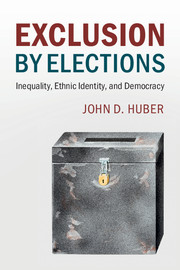2 - Why Worry about Inequality and Ethnic Politics?
Published online by Cambridge University Press: 18 May 2017
Summary
The central argument of this book is that economic inequality and ethnic diversity interact to influence the importance of class and ethnic identities, and thereby influence the extent to which democracy can be expected to redress inequality. This chapter draws on the existing literature to motivate and situate the research in two respects. The first is to describe the substantive consequences of an electoral dynamic that fails to address inequality and instead encourages ethnic politics. Why do we care if democracy fails to redress inequality, or if electoral competition fosters ethnic identities? The second is to situate the argument in two existing literatures. How have scholars previously studied the salience of ethnic identity in electoral politics, or the politics of redistribution? How does the argument here contribute to these previous approaches?
The chapter has four sections. Section 2.1 reviews arguments about the problems associated with leaving inequality unaddressed, and Section 2.2 discusses problems that can ensue when ethnic identity becomes salient in politics. The remaining two sections situate the argument in the literature on ethnic politics (Section 2.3) and redistribution (Section 2.4).
PROBLEMS WITH INEQUALITY
Economic inequality is often viewed as intrinsically unjust, and normative theorists have articulated a number of frameworks for thinking about how to evaluate different distributions of economic well-being, and of policies that change these distributions. A Rawlsian perspective, for example, encourages us to consider the “fairness” of economic outcomes, in which the notion of “fairness” emerges from thinking about choice from behind Rawls’ veil of ignorance. Rawls argues that from behind such a veil, people would agree on a distribution of welfare that satisfies a maximin principle, in which society is structured so as to maximize the well-being of the least well-off individual (see Rawls 1971). This perspective does not preclude economic inequality: it may well be that the social structure that maximizes the well-being of the least well-off individual will also lead to inequality of outcomes. Taxes on the rich, for example, could be used to obtain revenues that are redistributed to the poor, but if such taxes are set so high that they substantially discourage economic activity, they may not maximize the welfare of the least well-off. Such taxes would be unjust from the perspective of Rawls’ “fairness principle.”
- Type
- Chapter
- Information
- Exclusion by ElectionsInequality, Ethnic Identity, and Democracy, pp. 17 - 32Publisher: Cambridge University PressPrint publication year: 2017



